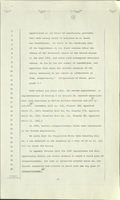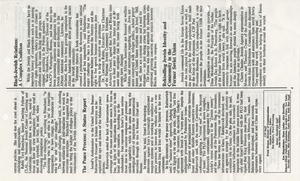Search the Special Collections and Archives Portal
Search Results
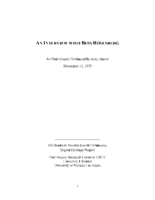
Transcript of interview with Bess Rosenberg by Jerry Masini, November 12, 1975
Date
Archival Collection
Description
Interview with Bess Rosenberg by Jerry Masini on November 12, 1975. In this interview, Rosenberg describes coming to Las Vegas in 1942, and the desert landscape. She gives an in-depth recollection of the first atomic test, and talks about different weather and the seasons in Las Vegas. Rosenberg describes several clubs and hotels around downtown and the recreation at Lake Mead and Mount Charleston.
Text

Transcript of interview with George Gilbert by Ruth Guidi, February 10, 1975
Date
Archival Collection
Description
On February 10, 1975, Ruth Guidi interviewed George Gilbert (born 1931 in Southgate, California) about his life in Nevada. George first talks about his education in Las Vegas and his family background. He also talks about times during World War II, the shopping facilities available to those in Las Vegas, the casinos that existed, the churches that were built, and the Helldorado parades. The two also discuss social clubs, politics, the atomic testing, environmental and social changes, the Mormon Fort, Hoover Dam, and the first movie theaters.
Text
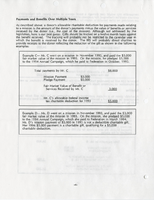

Eloiza B. Martinez oral history interview: transcript
Date
Archival Collection
Description
Oral history interview with Eloiza B. Martinez conducted by Maribel Estrada Calderón on October 10, 2018 for the Latinx Voices of Southern Nevada Oral History Project. Martinez discusses the career preparedness she took while working for Commercial Credit Corporation and studying with Mayor Oscar Goodman. She then describes her first impressions of Las Vegas, Nevada and about her community involvement. Martinez then discusses her work at Wells Fargo as loan officer and assistant vice president, and talks about discrimination in the workplace and in the neighborhood where she grew up.
Text

Andrew Walsh oral history interview: transcript
Date
Archival Collection
Description
Oral history interview with Andrew Walsh conducted by Barbara Tabach and Claytee D. White on February 13, 2019 for the Remembering 1 October Oral History Project. In this interview, Walsh recalls his early life in New York City, New York, and working for the New York Police Department. He then recalls moving and joining the Las Vegas Metropolitan Police Department in 1998. He discusses his current position as Deputy Chief/Division Commander of Tourist Safety, his role in the aftermath of the October 1, 2017 mass shooting at the Route 91 Harvest Festival, and community healing.
Text

Andrea Gardea oral history interview: transcript
Date
Archival Collection
Description
Oral history interview with Andrea Gardea conducted by Barbara Tabach on June 26, 2019 for the Remembering 1 October Oral History Project. Gardea starts talking about her early life, family, and family history. She explains why she moved to Las Vegas, Nevada in 2002 and why she chose to attend University of Nevada, Las Vegas. After, Gardea describes what happened before and during the Route 91 Harvest festival, what she experienced during the shooting, and her journey in escaping the scene. She talks about the aftermath of the shooting, the trauma and PTSD experienced, and her healing process. Gardea also talks about the making of Engelland’s Vegas Born Heroes Foundation in 2018, what they do, and what they represent. Lastly, she talks about her opinions on gun control and her viewpoint on making peace.
Text

Transcript of interview with Elmer Hilsinger by Irene Rostine, October 2, 1991
Date
Archival Collection
Description
When Mr. Elmer Hilsinger arrived from the Los Angeles area in 1942, to work as a Refractory Inspector in the Engineering Department at Basic Magnesium Incorporated (BMI), little did he know the town site would grow to be known as Henderson, Nevadain a few short decades. Mr. Hilsinger’s oral history provides a glimpse of the work being done by women at BMI, including women working as chemists, truck drivers, and secretaries. His words attest to the strong work ethic demonstrated by women at the plant during the “war work” period. Through Mr. Hilsinger’s story, we are also provided with an account of what daily life was like for a married couple, including Mr. Hilsinger’s life with his wife who worked as a waitress at Anderson Camp. In addition, Mr. Hilsinger’s oral history touches on the evolution of safety rules within the plant, the transition from the American Federation of Labor Union to the Congress of Industrial Organizations Union, and the role prostitution played during the tim
Text
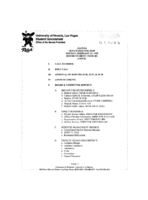
Meeting minutes for Consolidated Student Senate University of Nevada, Las Vegas, February 13, 1995
Date
Archival Collection
Description
Text

